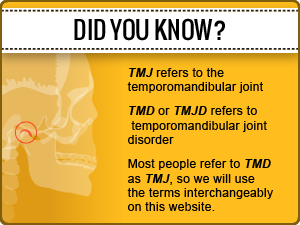Stress
What does it have to do with TMJ?Can stress cause TMJ?
Biochemical stressors
On top of life stress, we also have biochemical stressors such as diet, allergies, hormones, medications, alcohol, and disease or illness
Physical stressors
including posture problems, habits, muscles, bones, joints, trauma, motor vehicle accidents, spines, discs and many more.
Emotional or Life stressors
Everything in life is attached to stress whether its friends, families, jobs, money issues etc. The problem is how we react to life stresses and how they affect us. Life stress also includes changes that are positive. The stress is not the problem but rather how are bodies deal with the stress.
Do I have TMJ Disorder?
Symptoms include migraines, neck pain, jaw pain, lower back pain, snoring, sleep apnea. Use our Free TMJ Disorder Assessment ToolsPainful symptoms
Not surprisingly, these habits often go unnoticed until a friend or family member mentions it. Sometimes, however, they may only surface when these symptoms start to appear:
- Persistent headaches or migraines especially tension headaches and chronic daily headaches
- Sore teeth, frequently the teeth appear normal in spite of the pain, many people have had unnecessary root canal treatments done on teeth which does not resolve the pain
- Ear pain or stuffiness
- Aching jaw and/or neck
- Jaw and facial muscle spasms
- Neck strain
- Clicking or popping in the jaw joint when chewing, yawning or talking
- Limited opening and a previous history of clicking
- Numness or feelings of cold hands
- Problems with equilibrium
Evaluation, treatment, relief
 TMD is a complex group of disorders, so it is necessary to obtain a detailed medical history, as well as a full clinical evaluation to get a comprehensive understanding of the issues causing your TMJ/TMD. We will conduct examinations, which may include the following:
TMD is a complex group of disorders, so it is necessary to obtain a detailed medical history, as well as a full clinical evaluation to get a comprehensive understanding of the issues causing your TMJ/TMD. We will conduct examinations, which may include the following:
- Dental history
- Medical and Life history as related to current issue
- Skeletal structure
- detailed muscle palpation studies
- Jaw position and movement
- Neurological examination
- Other diagnostic tests or x-rays of the ligaments, muscles and airway
Phase 1: Returning physiological health
After assessing the results of your examination, we will discuss the outcomes with you, and outline a plan of treatment to address your specific concerns. Treatment types may include simple solutions such as:
- Diet modification, specifically avoiding hard foods and chewing gum
- Behavior modification (quit chewing your fingernails!)
- Physical therapy which may include jaw, neck or head exercises
A big part of our TMJ treatment regimen is to bring the nervous system back into balance. To do this, we use SPG blocks (Sphenopalatine Ganglion Blocks) and the NuCalm System. SPG blocks work to eliminate pain and NuCalm helps to relax you naturally. Once free of stress overload, your autonomic nervous system will begin to ease back into balance.
Phase 2: Stabilization
Once your jaw’s physiological health has been restored, the next step is top keep it that way. We start this treatment process off with more diagnostics. This time it’s in the form of a diagnostic orthotic. The diagnostic orthotic is utilized to let the body healing occur, the best doctors do not heal patients but rather remove the impediments to healing, that is exactly what we want your diagnostic orthotic to do for you. A diagnostic orthotic helps to determine which of the following long term stabilization treatments will be the most effective:
- Custom oral appliances
- Jaw realignment
- Orthodontics
- Epigenetic orthodontics. Also know as a DNA appliance
- Dental restorations such as crowns, bridges and implants
- Treatment of sleep disorders
- Other treatment, as recommended
Resolve your TMJ stress
Find out more about the stress-related causes of TMJ by downloading our free e-book today. Please contact our office if you would like to set up a consultation to discuss stress-related TMJ disorders.


0 Comments